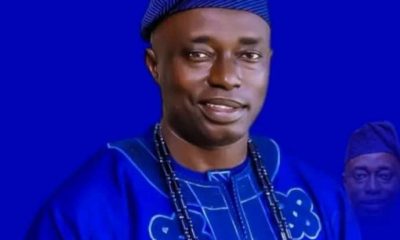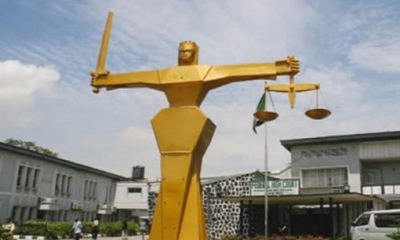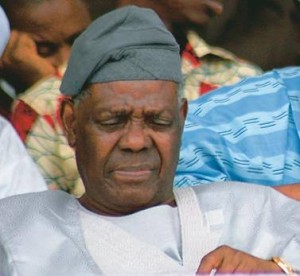News
My Political Inspirations at 79 By Chief Adebisi Akande

I once served as a local government councillor. It was like being a local legislator combined with others to exercise joint executive functions. I was a member of the constituent assembly (MCA) that drew up the 1979 Constitution for Nigeria. It was like being a legislator in a national sovereign conference. I was Secretary to a state government. It was like being a Chief of Staff and a Chief Special Adviser to the Chief Executive on Cabinet matters and more at the centre of powers. I was a Deputy Governor. It was like learning to be a ceremonial Chief Executive with privileges to be consulted, to warn and to advise on executive functions. And I was an Executive Governor. That was, to me, a totally powerless office; yet, the bucks ended on my desk. Those bucks were coming in the form of letters, memoranda, minutes in files and at meetings – all these were always asking me to take an average of one hundred decisions daily when surrounded by mostly inefficient and corrupt government institutions and with no money to fund the decisions into realities; and were also regarding me as the chief security officer of the state, whereas the allegiance and control of the security agencies belonged elsewhere.
Finally, for eleven consecutive years, I was the national chairman of several political parties in succession. Before then, I had been a state vice-chairman of the Unity Party of Nigeria (UPN), a state chairman of a cultural organisation (Afenifere) and a state party chairman in Alliance for Democracy (AD). All those positions gave me pioneering opportunities in joining others to form political parties. I shoud know, therefore, that political parties (if well led) are essential lubricants for the smooth running of democracy in the Western sense.
Prior to colonialism of the 19th Century, there were numerous tribal principalities of various clans or village communities with different sizes of land mass and population all over the jungles of Africa. Slave trade, which was characterized by man hunting fellow men for sale, intensified inter-tribal wars and necessitated the establishment of tribal principality and kingdom settlements. Thus, before the Europeans colonized Africa, the commonest administration in vogue can be described as ‘Tribal Kingdom or Municipality governments’. It was a feudal government arrangement which varied from one form of agricultural settlement to anoother. Its effective running, particularly in Yoruba land, was always being propelled, managed and assisted by native guilds, cults or groups of associations like ‘Osugbo’, ‘Etu-Ife’, ‘Sansawo’ or ‘Parakoyi’. When the kingdom or municipality authorities lapsed into tyranny, some of those guilds, cults or associations went underground and became secret societies, clandestinely and furtively seeking to change powers.
In features, feudalism is native dictatorship. Colonialism is the dictatorship of the foreign invaders. When the British came, they were too few to directly administer each and all the inherited Tribal Municipalities and Kingdoms in Nigeria. They had to constitute each group of the Tribal Municipalities and Kingdoms into what they called ‘Native Authority’ under the supervision of British officers in a system called ‘Indirect Rule’. In other words, before the introduction of Western education, particularly to Nigeria, and before intensive protests by the elite class, what politicians now called ‘African Democracy’ was largely the exploitation of the masses by the few elites holding offices perpetually as kings and chiefs but covering up their actions with deceit, cajolery, intimidation, repression, and, sometimes, absolute brute force.
Western education and participation of Africans in the military during the First and Second World Wars created a new set of elites who became known as “politicians”, and they eventually took over powers from the colonial officers. During the cold wars which followed the two World wars, the global political debates on economic programmes were for choices between ‘Socialism’ and ‘Capitalism’, while the debates on the form of suitable government in Africa oscillated between those for one-party and multi-party presidentialism or among people of total ignorance part of whom were already smarting under parliamentary democracy apprentices. Nigeria had to follow her British colonial masters in practising multi-party parliamentary democracy. Up to the present age, evidence-based analyses has proved parliamentary democracy to be the most accountably transparent form of government in the whole world. It has made the United Kingdom lasting, rich, stable and respectable globally. It makes the very young Israel very strong economically and militarily. It is transforming India from acute poverty and hunger into self sufficiency and reliability in virtually in all fields. Considering that, apart from being transparent and very accountable, Parliamentary Democracy is absolutely inclusive. Therefore it appears to be the best form of governmental structure for Nigeria now.
We have seen from the above that African Tribal Municipalities were dictatorial, corrupt and oppressive. With independent political party arrangements devoid of regimentation by legislations, multi-party parliamentary democracy can make Nigeria great too. Democracy – the type being practised in the UK, India, Canada, Australia for many centuries now and in Israel since 1948 – has become the accepted culture of the people in those climes. Anything less accountably transparent cannot be good for Nigeria – an African country that has suffered slavery, repressions and indignities for centuries and whose education has been so ruthlessly bastardised in the recent times to the extent that University graduates are no longer gainfully employable. It is because our educational system is bad that our people are abjectly poor. The American democracy of multi-party presidentialism is too complicated and costly for a country of poor people with large illiteracy rate like Nigeria.
Ladies and gentlemen, given the benefits of hindsight and our unsavoury experiences in the past, it is now crystal clear that multi-party parliamentary democracy is the best form of government that is left available for Nigeria, if it wants to catch up with the rest of the civilised and rapidly developing world in the next decades before oil revenues will no longer be in vogue.
My Political Inspirations at 79
By Chief Bisi Akande,
ILA ORANGUN.
16th January, 2018.
-

 News4 days ago
News4 days agoOsun Assembly Aspirant Pledges People-centred Representation For Boripe/Boluwaduro constituency
-

 News5 days ago
News5 days agoOver 100 Deaths Averted As Soldiers Evacuate Suspected Bomb From Church Premises In Abia
-

 News3 days ago
News3 days agoBandits Attack Kwara Communities, Kill Villagers, Burn Houses
-

 Crime5 days ago
Crime5 days agoOsun: Court Remands Fake Herbalist Over N12.5million Fraud



